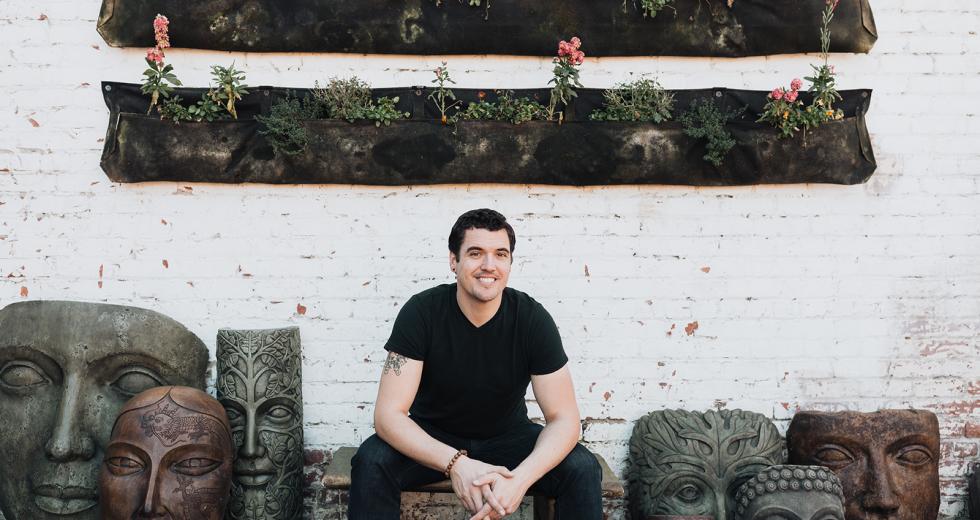Micah Kearns is no stranger to mistakes, failures, snafus or rock bottoms. Life experience, along with a gentle demeanor that suggests he is the physical embodiment of a “safe space,” make him quite the fit as chapter organizer of F—up Nights Sacramento. Kearns organizes, hosts and creates marketing for the event, in addition to coaching and supporting speakers through the process.
The global speaker series, which Kearns recently brought to Sacramento, resembles TED Talks in its format and inspirational tone, but flips the typical success story on its head to highlight people’s professional failures. “The aim of the events,” the BBC reports, “is to take the sting, shame and guilt out of failure, share stories in a supportive environment, workshop the experiences and figure out what could have been done differently.”
Given a limit of 10 slides and seven minutes (although most go longer), speakers bare their souls and their professional blunders, from budgetary disasters to partnerships gone sour. Although Kearns, also a graphic designer and owner of Foxhaus Creative, values true down-in-flames stories without a cushy silver lining, the story arcs do conclude with a lesson that ultimately imparted wisdom and strength upon the speaker. (Full disclosure: I experienced the process firsthand when I delivered my own F—up Nights speech in November.)
Kearns puts his own offbeat spin on the Sacramento chapter by curating eccentric acts (jugglers, comics) in between speeches, “almost like a variety show,” he says. His goals for the chapter are to build out a team to streamline processes and to generate more sponsorships. The next event will headline artist David Garibaldi and will take place March 9 at the biggest venue yet, Crest Theatre. Read on to get this shame-tamer’s take on embracing failure through self-reflection instead of letting it erode self-worth:
How I describe what I do: When I first started it, I thought it was just, you know, throwing a quirky, cool event series. But the more I do it — I’m currently building my fourth event — I realize that it’s not just throwing events. I’m surprised and touched and grateful by how much it resonates with people. I think I’ve started adopting more of a position of realizing how much the message means to people.
How F—Up Nights Sacramento was born out of my misfortune: (The Sacramento chapter) exists because I was going through the worst part of my life. I had this surprise divorce, got laid off and kind of became estranged from my family, and just needed something to hang onto that had purpose. Like, not just something fluffy, but I needed something with purpose that I could pour myself into.
How making a career change has changed my life: After being laid off in the middle of my divorce in 2018, and then feeling like the next job I had wasn’t a good fit for me, I heard about F—up Nights from a friend. I immediately quit my job and signed up for it and started going with it. Surrounding myself with this message every day has been so incredibly therapeutic and healthy, and it’s made such a difference in my life just because I, like, really internalized it and decided to walk the walk.
The ingredients of a good f—up story are: Humility, relatability and consequence. … Your ego really wants to protect your self-interest by minimizing f—ups and trying to make yourself seem as important as possible. So a really good … story is when somebody is able to get on stage and be completely humble and open in front of the audience and just say, listen, I’m going to come clean and this is what happened and I don’t need to placate my ego during the story.
The second part is relatability, where the audience is leaning forward and they’re really gripped in the story because they’re like, oh my God, this could happen to me. Or, oh my God, this has happened to me. A story that is relatable to the audience is really valuable.
And then consequence, I think, is the third biggest part. There’s a lot of … stories where somebody (messed) up but then they get saved by someone else, or a coincidence that kept them from completely crashing and burning. But I think (the consequence piece is crucial) to really drive home the lessons involved of the inherent risks of being a business person or professional, and doing things that you need to grow. The most valuable stories are oftentimes the one where the person just, you know, messed up … and there was a heavy consequence. They went down in flames and there was nothing there to save them. Those are normally stories where people are on the edge of their seats and also have the most respect and admiration for the speaker that they survived it, and they’re strong enough to actually share that story.
Micah Kearns organizes each event to include an eccentric mix of
talent and speakers. (Photo by Nicolette Lovell)
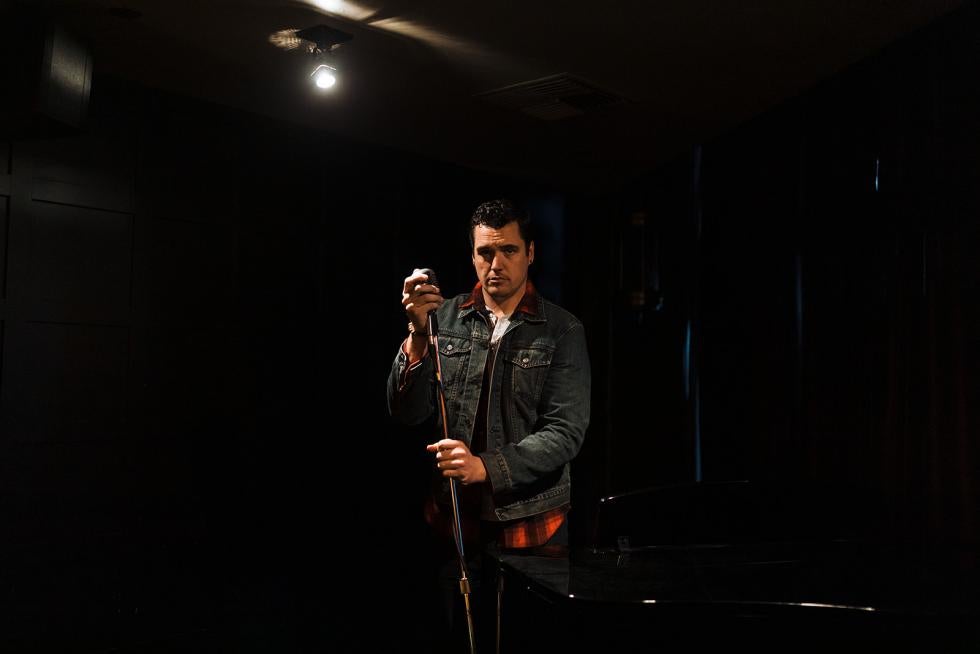
How I sculpted the Sacramento chapter’s creative tone: It’s funny because, looking around at other chapters in other cities, the Sacramento chapter is definitely unique. And I think a large part of that is me not knowing what I’m doing. (Laughs) I was completely happy and willing to go in … gung ho and just started going for it. Also, a lot of other cities have pretty big sponsorships behind them and I’m bootstrapping everything.
Another thing is, I’ve watched other events on YouTube, but I’ve never been to another F—up Night. And so I really am going on what my concept of a good event would be.
My thoughts on using humor and poignancy to lift the stigma of failure: I think humor adds a lot of levity to it. It’s almost like a pressure relief valve where the thought of (messing) up releases a lot of pressure on people. … (On the other hand), the therapeutic ethos of F***up Nights that it’s OK to fail, that it’s a necessary stepping stone to success, it resonated really strongly with me. It really means a lot to me — when I’m sitting down and writing those longer posts — to be able to share my insight and experience as well. I really want to give people resources, but then also give them that humorous, light pressure relief valve of saying, “Hey, (messing) up is cool, and we don’t have to take it that seriously all the time.”
How sharing a story of failure can transcend the stage into real life: It’s a weird duality that by opening up and sharing your (mistake), it sort of absolves you of the weight and shame of that burden. By being vulnerable, it makes you invulnerable. Because if you show something to somebody and say, like, here’s my biggest f—up, I’m owning it. There really is a position of strength in being vulnerable, because when you’re open, you’re willing to show your weaknesses and then just push past them. That makes you so much stronger than someone (who) is terrified of being exposed.
The jobs along the way that, in a weird way, prepared me for this role: Let’s see. … I was an au pair in Paris — I took care of three little French kids, and tried teaching them English. I’ve been a summer camp counselor for little kids at an ecology summer camp. So I really like taking care of people.
I played guitar in the streets for money when I was there to make ends meet until I found the au pair job. … Two areas in school that I really excelled in were arts and music. I took, like, every single music class that my high school offered, so entertaining comes naturally to me.
I also worked in a scuba diving shop in Milwaukee doing shipwreck diving in Lake Michigan. … I was a full-time sailing instructor in Wisconsin, where I was also the marketing and PR chair of the sailing club as well. And that was my first experience starting to organize events. Because I was an instructor, I was in front of groups of people all day, every day. I had zero problem leading a class of 20 people or giving tours of the facilities for much larger groups. And then when we would do events, I would have to get up and talk in front of, you know, everyone.
And then as I started doing design and marketing consultation for small businesses, I wasn’t on stage anymore, but I helped plan a lot of events … so, you know, doing the background logistics. … When I went on to work as the creative director of Broderick Roadhouse here in Sacramento, I got really involved in planning much larger events.
My favorite neighborhood in Sacramento: I am morally obligated to say North Oak Park. I love it here, I bought a house here. It’s a really cute neighborhood. Plus, North Oak Park does have Arthur Henry’s, which is my favorite place in all of Sacramento. Oh, man, it’s, like, gritty and classy in such a perfect balance. I like old music, and they have a free jukebox. And I love cooking steak on the grill and the whiskey cocktails and the dim lighting and the flocked wallpaper and the live jazz on Fridays. It’s intimate, it has those massive vinyl booths so you can crowd into booths with a bunch of friends. It’s a terrific date spot. Everything about it is perfect.
–
Get our Getting to Know column and other great articles delivered straight to your inbox: Sign up for the Comstock’s newsletter today!
Recommended For You
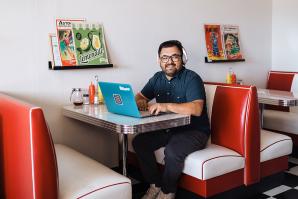
Getting to Know: Johnny Flores
As business heats up, the podcaster is winding down ‘Serious Talk. Seriously.’
After 25 years of working 9-5 jobs, Johnny Flores has gone all in on his podcast business, Flores Podcast Consulting, and as a result says he is “happier and more peaceful” than ever.
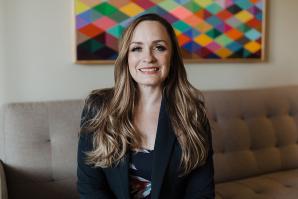
Getting to Know: Jennifer Reason
The host of Capital Public Radio’s midday show is spreading her love of classical music
Jennifer Reason is the new host of Capital Public Radio’s midday classical show, where she gets to talk about classical music to an audience of other die-hard fans and, hopefully, open the minds of some new (read: younger) fans along the way.
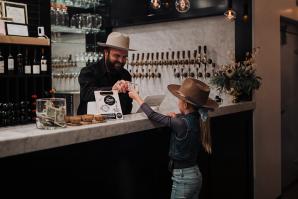
Getting to Know: Jordan Minyard
Auburn cafe owner aims to offer a special experience for customers
With a seasonal menu, beautifully arranged florals, and a patio and mural for that OK-I-have-to-Instagram-this moment, The Pour Choice is about providing an experience to those who visit Auburn.

Getting to Know: Angie Franklin
Afro Yoga founder connects people to themselves and others
Angie Franklin’s Afro Yoga in Sacramento incorporates elements of social justice and inclusiveness with yoga’s shared values of wellness and health.



